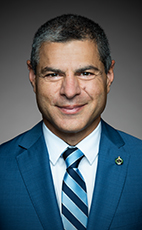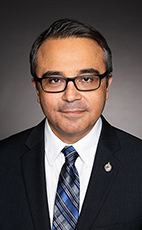44th Parl. 1st Sess.
June 16, 2022 10:00AM
- Jun/16/22 2:34:12 p.m.
- Watch
Mr. Speaker, on this side of the House, it is clear that we will always protect Canadians' needs and safety. That is exactly why we invoked the Emergencies Act. In the process, we sought the advice of the police and used that advice to make our decisions.
On the other side, there are the Conservatives, who encouraged the illegal blockade. They must apologize.
63 words
All Topics
- Hear!
- Rabble!
- add
- star_border
- share
- Jun/16/22 2:34:47 p.m.
- Watch
Mr. Speaker, the Minister of Emergency Preparedness, himself a former chief of police, said the following in committee, referring to the Emergencies Act: “I do not believe that would have been an appropriate thing for law enforcement to ask, and they did not ask”.
The reality is that we have a Minister of Public Safety who has totally lost Canadians' confidence. There is only one course open to him now, and that is to do the honourable thing and resign. What is he waiting for?
87 words
All Topics
- Hear!
- Rabble!
- add
- star_border
- share
- Jun/16/22 2:36:35 p.m.
- Watch
Mr. Speaker, we have been consistent and clear on this side of the House that the decision to invoke the Emergencies Act was necessary because it was needed to restore public safety. Past president of the Ontario Association of Chiefs of Police, Chief Gary Conn, said that, in their view, the Emergencies Act provided the appropriate authorities and powers for police services to ensure the rule of law and the safety of citizens. He said that had been their experience, particularly during the “freedom convoy” of 2022.
That is law enforcement right there, and it was the Conservatives who exacerbated the situation with their reckless behaviour.
108 words
All Topics
- Hear!
- Rabble!
- add
- star_border
- share
- Jun/16/22 2:37:16 p.m.
- Watch
Mr. Speaker, these are more diversion tactics to avoid answering one simple question. The public safety minister has misled Canadians and Parliament. Law enforcement did not ask to have the use of the Emergencies Act. It is just that simple. I will quote the emergency preparedness minister: “I am not aware of any recommendation of law enforcement.”
Will the minister do the honourable thing and resign today, right now?
71 words
All Topics
- Hear!
- Rabble!
- add
- star_border
- share
- Jun/16/22 2:37:45 p.m.
- Watch
Mr. Speaker, doing the honourable thing means protecting Canadians. That is why we invoked the Emergencies Act. Doing the honourable thing means not taking that decision in a vacuum, which means consulting with police, searching for their advice and using that advice to inform the decision of the Emergencies Act, which is why police associations across the country supported the decision.
It was the Conservatives who knew all to well that, by making reckless statements asking the blockades to double down and entrench, they were undermining public safety, and they should apologize for that role. They undermined public safety, but on this side of the House, we protect it
109 words
All Topics
- Hear!
- Rabble!
- add
- star_border
- share
Madam Speaker, I am proud to rise in the House today to support my colleague, the hon. member for Longueuil—Charles-LeMoyne, and her Bill C-224, an act to establish a national framework for the prevention and treatment of cancers linked to firefighting.
I am equally proud tonight of all members in the House for their speeches and for sharing their personal experiences. It shows how important this particular topic is to all of us, so I say a special thanks to them.
Firefighters, as we have heard tonight, play a critical role in keeping our communities safe. We all depend on their training, skills and expertise when an emergency arises. That is why I am proud to support my colleague's bill.
In April of this past year, I sat down with firefighters in my community to discuss what their needs were when it came to being able to do their jobs safely and go home at the end of each shift to live happy, healthy and long lives. Each firefighter, to a person in the room, pointed to Bill C-224 to do exactly that.
This bill seeks to develop a national framework to promote greater awareness and education about occupational cancers linked to firefighting, and to support prevention and early detection of these terrible diseases all across the country. Occupational cancers, as we have heard tonight, are the leading cause of death among firefighters, according to the International Association of Fire Fighters.
It is impossible to imagine the number of carcinogens in the air as a firefighter bravely runs into a building that has gone up in flames. More than that, how many of these carcinogens follow the firefighters back to their stations and homes on their gear, trucks and equipment? This hazardous material cannot be easily washed away, as we have heard tonight, and can quickly lead to illnesses such as cancer among firefighters in the line of duty.
One of the goals of Bill C-224 is to explain the link between firefighting and certain types of cancers. It also provides measures that would explain the link between cancer and the profession to better identify the education needs for health care and other professionals to promote research and information sharing.
Without identifying and understanding the problem, we cannot fight the problem, so it is essential that we work to fully understand the way firefighters are put at different levels of risk than other first responders based on the nature of their work. This national framework would help us to better understand the real numbers behind occupational cancers among firefighters.
The words “national framework” are a very important part of Bill C-224. According to the International Association of Fire Fighters, and we heard this tonight, there were more than 400 deaths that were formally accepted as job-related. However, the association believes the true number of occupation-related firefighter cancer deaths is likely higher, considering that not all provinces and territories formally recognize all the same cancer types as occupational among firefighters.
For example, Manitoba recognizes 19 cancers as occupational cancers, while B.C. only recognizes nine. Quite frankly, and we have heard this tonight, our firefighters deserve better. By establishing a national framework, we could ensure that education, information and training to prevent occupational cancers could be shared across this country.
While this bill seeks to create standards across the country, we can learn from other provinces' successes and failures when it comes to supporting our fire services, and where the inequalities lie when it comes to recognizing occupational diseases. For example, women in the fire service continue to be left behind, with only five of our 13 provinces and territories recognizing that cervical and ovarian cancer can be caused by occupational health hazards female firefighters face in the line of duty.
I must say I am very proud of my province of Nova Scotia for announcing this year that, effective July 1, these cancers and 11 others would be formally recognized as occupational, bringing the recognized occupational cancers in Nova Scotia to 19, which is the highest recognized number in the country.
Speaking of Nova Scotia, as a member whose constituency is primary rural, I would also like to acknowledge that most rural communities in Canada rely on volunteer fire services. While professional fire departments may have state-of-the-art equipment for decontamination and gear storage, small and local volunteer firefighter operations may not have the same tools and best practices to keep them safe. That is why the ability to share standards across the board is so critical and so valuable.
Firefighters and their families deserve to know and to fully understand the risks associated with their careers, how to mitigate them and what the best practices are to keep them safe in the line of duty. We can help to make that happen.
I have spoken in the House quite a bit about my dad, Mick Kelloway. Dad was a first responder in mine rescue. I think back to the work we did as a country to support our miners' occupational health and safety, and I firmly believe that as a government and a group of individuals, it is incumbent on us to do the same for our fire service. Firefighting, we know, is a dangerous occupation as it is, let alone when we think about the toll that the work takes on people's bodies. Whether they are responding to a highway accident or dealing with hazardous materials, cancer continues to be an epidemic within Canada's fire service.
Firefighters, both career and volunteer, have the backs of our communities and have protected us when we needed them the most. Now, they need us and I have no doubt that each member in the House knows that, especially after listening to the speeches tonight. By working together, we can do what is right and what is fair, and I urge all members to join me in supporting Bill C-224 for the betterment of our fire services from coast to coast to coast.
1018 words
All Topics
- Hear!
- Rabble!
- add
- star_border
- share
- menumenu
- notificationsnotifications
- home
- mailmail
- searchsearch






